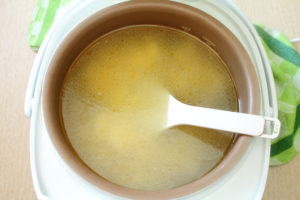Low Residue/Low-Fiber Diets
Immediately after your liquid diet therapy, you are advised to follow a low residue or low-fiber diet. A low residue diet limits the amount of dietary fiber and residue-providing food in your diet. Following a low residue diet is generally limited to one or two weeks. We recommend that you discuss your specific timeline for low residue diet with your physician.
Beverages
Allowed
Coffee, tea (Calming Blends Diverticulitis Tea), decaf coffee and tea, cocoa, carbonated beverages, fruit flavored drinks without pulp.
Limit Consumption
Any beverages containing foods not allowed; alcoholic beverages
Breads and Cereals
Allowed
Refined white, light wheat or rye bread and rolls; saltines, or soda crackers. All refined, cooked and ready-to-eat cereals (oats, wheat and rice) such as Wheat hearts, Malt-O-Meal, Special K®, Cheerios®, Post Toasties.
Limit Consumption
Rolls with nuts, seeds, coconut or fruit not allowed; bread containing cracked wheat particles or whole seeds; coarse, dry cereals; any with bran or raisins. Graham crackers, corn bread.
Soups
Allowed
Creamed soups with puréed or whole allowed vegetables; strained vegetable soups or chowders, meat or fish broths. See a sample recipe – Beef & Vegetable Soup.
Limit Consumption
Highly seasoned soups or those containing ingredients other than on the allowed list.
Desserts
Allowed
All plain puddings, custards, tapioca, gelatin desserts, fruit whips, smooth ice cream, fruit ice, plain sherbet, yogurt, cake and cookies.
Limit Consumption
Rich pastry or cakes. Those with nuts, seeds, raisins, coconut, dates or fruits not allowed.
Eggs
Allowed
Eggs
Limit Consumption
Egg dishes prepared with ingredients not allowed.
Fruits and Fruit Juices
Allowed
Fruit juice without pulp. Canned: applesauce, cherries, fruit cocktail, peaches Fresh: bananas, cherries, grapefruit, melon, nectarine, peaches, plum
Limit Consumption
Fresh: pineapple, pears, apples, apricot, avocado, berries, mango, pear, dried dates, figs, prunes, raisins
Meat or Meat substitute
Allowed
Tender, broiled, stewed or creamed, roast beef, veal, lamb, pork, ham, poultry, fish, chopped clams, oysters, liver, kidneys; Cream cheese, cottage, American, cheddar, Swiss or jack cheese, smooth peanut butter.
Limit Consumption
Fried meats, fish or poultry; meats highly seasoned or containing whole spices; sausage, frankfurters. Strong cheeses or those containing seeds. Dried beans or peas, chunky peanut butter.
Vegetables and Vegetable Juice
Allowed
Cooked or canned artichoke hearts, asparagus, beets, carrots, chard, green and wax beans, bean sprouts, mushrooms, pimento, pumpkin. Fresh and cooked tomato (no seeds or skins), stewed, pastes, purees. Tomato juice. Limit vegetables to 2 servings/ per day.
Limit Consumption
All other raw, strongly flavored vegetables (cabbage, broccoli, cauliflower, summer squash, okra, Brussels sprouts, parsnips, rutabagas, turnips, onions, corn, baked beans). All others not listed as allowed.
Sample Daily Low Residue Meal Plan*
Breakfast
- ½ cup fruit juice
- 1 egg
- ½ cup cereal or 2 slices enriched white toast
- 1 tsp. butter, avocado oil or olive oil
- 1 cup low-fat milk
Lunch
- 2 slices enriched white bread
- 2 oz. meat
- ½ cup vegetable
- 1 tsp. butter, avocado oil, olive oil or mayo
- 1 serving fruit or fruit dessert
Dinner
- 3 oz. soft (boiled) meat, trimmed of fat and tough ends
- ½ cup potato or substitute
- ½ cup vegetable
- 1 serving enriched white bread
- 1 tsp. butter, avocado oil, olive oil or mayo
- 1 serving dessert
- 1 cup low-fat milk
*Information adapted from Manual of Clinical Dietetics, American Dietetic Association, 6th Edition, © 2000

